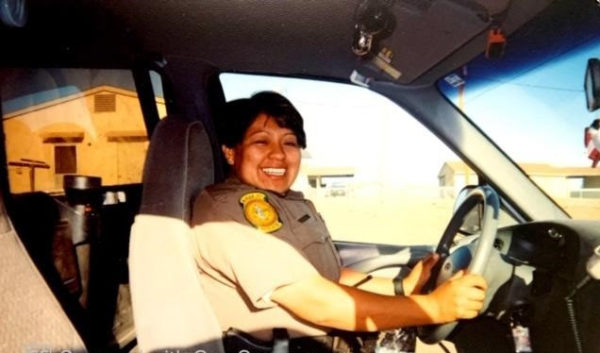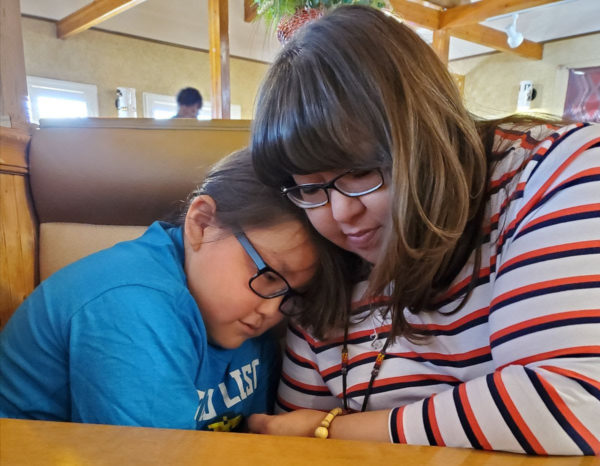
- Details
- By Levi Rickert
WINDOW ROCK, Ariz. — As of Thursday, there were 71 reported COVID-19 related deaths on the Navajo Nation, the country’s largest Indian reservation.
Behind the growing number of deaths is the sadness of the tragic loss of lives that impact Navajo families.
One Navajo family is mourning the deaths of two sisters, Corrina and Cheryl Thinn, who both died last month from the novel coronavirus.
Both sisters spent their careers serving the Navajo Nation.
Corrina served in the Navajo Nation Police Department for 11 years, starting in 1999. She served with the Tuba City District until 2010 as a Senior Navajo Police Department Officer. While a Navajo Police officer, she obtained her master’s degree in social work and went on to work various health centers on the reservation and the Navajo Nation Division of Social Services. She was also a Licensed Master of Social Work at the Tuba City Regional Health Care Center.
"On behalf of the Navajo Police Department, we extend our deepest sympathy and condolences to the family of Corrina Thinn during this difficult time," Navajo Police Chief Francisco said. "To the family of Corrina, there is no amount of words that will ease the pain of losing a loved one but please know that you are in the thoughts and prayers of our police family as you navigate through this time of mourning.”
 Cheryl Thinn and her son. (Photograph provided to by her family.)
Cheryl Thinn and her son. (Photograph provided to by her family.)
Corrina’s sister, Cheryl, served as a Navajo Nation Juvenile Detention Officer and Navajo Nation Emergency Medical Service member. She also worked for the Tuba City Regional Health Care Corporation.
“Our hearts are with the families of Corrina and Cheryl Thinn,” said Speaker Seth Damon. “Both sisters served the Navajo Nation on the front-lines for the health and safety of our communities. On behalf of the Navajo Nation Council, I extend my deepest condolences to the friends and family of Corrina and Cheryl, each taken by the coronavirus.”
Speaker Damon was notified Thursday of the passing of both Corrina and Cheryl Thinn by members of the 24th Navajo Nation Council and the Navajo Nation Division of Public Safety.
“In the spirit of k’é, I call on all our relatives to honor Cheryl and Corrina for their service to the Navajo Nation and extend support to their families. They chose public service to protect and assist our families who were in critical need. Many of our heroes on the Navajo Nation are social workers and those who work on the frontlines as police or corrections officers. Their legacy will never be forgotten, and today we honor Cheryl and Corrina,” Navajo Nationi Council Delegate Amber Kanazbah Crotty said.
More Stories Like This
Native News Weekly (August 25, 2024): D.C. BriefsDeb Haaland Rolls Out Affordability Agenda in Albuquerque
Boys & Girls Clubs and BIE MOU Signing at National Days of Advocacy
National Congress of American Indians Mourns the Passing of Former Executive Director JoAnn K. Chase
Navajo Nation Mourns the Passing of Former Vice President Rex Lee Jim
Help us defend tribal sovereignty.
At Native News Online, our mission is rooted in telling the stories that strengthen sovereignty and uplift Indigenous voices — not just at year’s end, but every single day.
Because of your generosity last year, we were able to keep our reporters on the ground in tribal communities, at national gatherings and in the halls of Congress — covering the issues that matter most to Indian Country: sovereignty, culture, education, health and economic opportunity.
That support sustained us through a tough year in 2025. Now, as we look to the year ahead, we need your help right now to ensure warrior journalism remains strong — reporting that defends tribal sovereignty, amplifies Native truth, and holds power accountable.
 The stakes couldn't be higher. Your support keeps Native voices heard, Native stories told and Native sovereignty defended.
The stakes couldn't be higher. Your support keeps Native voices heard, Native stories told and Native sovereignty defended.
Stand with Warrior Journalism today.
Levi Rickert (Potawatomi), Editor & Publisher

